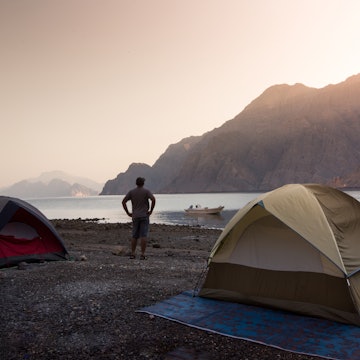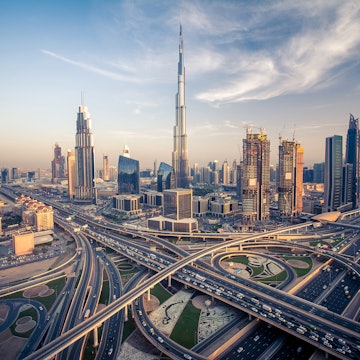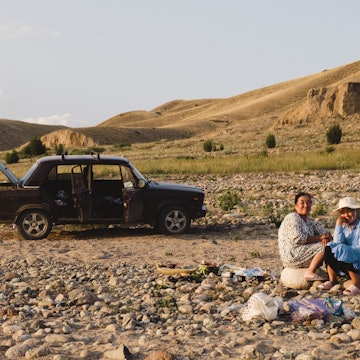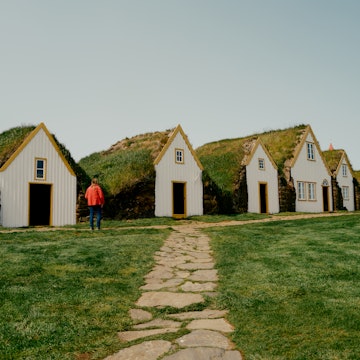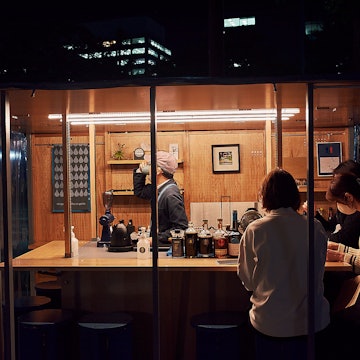

16th and 17th century architecture in Bukhara, Uzbekistan. Poliorketes/Shutterstock
There’s good news for budget travelers: Uzbekistan is one of Asia’s most affordable destinations.
Whether you are backpacking around Uzbekistan on a shoestring or looking to travel in a little more comfort, you’ll find that accommodations, meals and public transportation are all great value for money.
Explore the highlights of the Silk Road, hike in national parks, see quirky Soviet-era architecture – and even go skiing and snowboarding – without burning through your travel money. Try these tips for keeping costs down while exploring Uzbekistan’s ancient and modern wonders. It's important to note that due to the instability of the local currency in Uzbekistan (the Uzbekistani som) and rampant inflation, prices are listed below in American dollars.
A guide to daily costs
Dorm bed: US$8–10
Basic room for two: US$20–40
Tashkent Metro ticket: US$0.15
High-speed train ticket from Tashkent to Samarkand: US$11
Coffee: US$1–2
Beer: US$1–2
Snack: US$0.50–1
Dinner for two: US$5–10
Average daily cost: US$25–40

1. Travel to Uzbekistan in winter
To shrink the cost of travel in Uzbekistan, go between November and March. You’ll often have blue skies and bright sunshine, but as package tour groups don’t travel to Uzbekistan in winter, domestic and international flight prices are lower, and so are hotel rates. All the major attractions in Samarkand, Bukhara and Khiva are open year-round, and snowfall and truly cold temperatures are rare away from the mountains.
2. Look at flights to regional airports
The majority of international flights to Uzbekistan arrive in Tashkent, the busy capital, but you can save money by booking indirect flights to smaller regional airports. Turkish Airlines flies via Istanbul to Samarkand, Bukhara, Namangan and Urgench (the airport closest to Khiva), and Samarkand is served by several budget airlines including flyDubai from Dubai, and Wizz Air from Abu Dhabi.
You can also fly into and out from different airports in Uzbekistan – another good way to reduce costs as you won’t have to retrace your steps across the country.
3. Don’t pre-book airport taxis in Tashkent
Hotels in Uzbekistan are notorious for charging a substantial mark-up for airport transfers, preying on new arrivals’ worries that they won’t be able to find a taxi at the airport, or that taxi drivers will overcharge them. Fortunately, there are cheaper ways to get to town from the airport.
At Tashkent International Airport, you can save yourself money and stress by paying for your taxi at the official taxi desk next to the baggage carousel in the arrivals hall. Rates are set depending on the distance, you can pay by cash or card, and your air-conditioned taxi will be waiting for you in a dedicated parking area immediately outside the terminal building.

4. Navigate Tashkent by metro
Most hotels and tourist attractions in Tashkent are within walking distance of a metro station, while metro tickets cost just US$0.15 per single ticket, regardless of how far you go. Not only is this a cheap way to get around, you’ll also beat the traffic. Trains run from 5am until midnight – good for early starts and nights out.
You’ll also get to sightsee as you travel – Tashkent Metro is a tourist attraction in its own right as all the stations in the city center have been designed by different artists and architects. The space-themed Kosmonavtlar and the mosque-like Alisher Navoiy stations are particularly photogenic.
5. Pre-book train tickets online
When you’re traveling on a budget in Uzbekistan, train travel is your best friend. The high-speed Afrosiyob service is the fastest way to get from Tashkent to Samarkand, Navoi and Bukhara, and there are slower, inexpensive diesel services to many other cities.
Pre-booking your tickets via the official e-ticket website will save money on agents’ fees, but book well in advance because standard-class tickets tend to sell out quickly, leaving only the costlier business and VIP ticket categories.
6. Use a shared taxi to travel between cities
If you’re backpacking in Uzbekistan on a tight budget, hiring a car and driver may be unaffordable. Fortunately, local shared taxis will take you almost everywhere you want to go for a fair price.
Every town has a taxi stand (usually near the bus or train station) and a sign in the windscreen will tell you where each taxi is heading. Passengers pay for a seat, not the whole car, and the driver will depart when the vehicle is full. Drivers are often willing to negotiate, so ask if there’s any flexibility on the fare.

7. Stay in locally-owned hotels
Uzbekistan has many hotels run by international chains but they tend to be much more expensive than Uzbek brands. You can save money, have a more authentic experience, and contribute more to the local economy by booking local hotels, especially if you call or email to make your reservation rather than going through third-party booking sites.
8. Book a bed instead of a room
In smaller hotels and guesthouses in Uzbekistan, you often don’t need to book a room on your own. Many cheaper properties have rooms for four to six people that function a bit like hostel dorms. These inexpensive rooms are ideal for those traveling on a budget as you pay only for your bed and share a bathroom down the hall. If there are two or more rooms available, the hosts will usually offer you a bed in a single-sex room.
9. Ski at Amirsoy, but don’t stay
Amirsoy in Tashkent Region is Central Asia’s premier winter sports resort, and the prices for lift passes and equipment rental are a bargain. Hotel accommodation at the resort is expensive, however – budget travelers are better off staying nearby at Chimgan or Beldersoy, taking a bus or taxi to Amirsoy for days on the slopes.

10. Focus your sightseeing on religious sites
A large proportion of Uzbekistan’s tourist attractions are Islamic mosques, shrines, and madrassas (religious schools), but there are Christian churches and cathedrals, Jewish synagogues, and even Zoroastrian fire temples. As these are places of worship, most don’t charge entry fees, though donations are always welcome. Just remember to respect local etiquette for visitors – for example, removing your shoes before entering a working mosque.
11. See Khiva from the outside
Khiva’s ancient walled city, the Ichon-Qala, is a UNESCO World Heritage Site and it tops many tourists’ wish lists. However, entry costs up to US$15 for a two-day ticket and there’s a camera fee on top. You only need to pay these fees if you want to go inside the museums, palaces and mosques; there’s no charge to wander through the Ichon Qala’s streets and squares, viewing monuments from the outside.
12. Remember, cash is still king here
Cash is still king for smaller transactions such as transport, tickets, shops and local restaurants. Most banks change money easily and moneychangers operate at borders. Ipak Yoli Bank and the National Bank of Uzbekistan (NBU) are the most reliable. Bargaining is necessary at souvenir stalls, in bazaars and with taxi drivers. You might get a hotel discount in shoulder or off-season, but in general, rates are pretty reasonable.
Many hotels and some ticket offices, tourist restaurants and souvenir shops take debit and credit cards, but almost always add a surcharge of about 5% or sometimes higher. ATMs are common throughout the country.

13. Eat in traditional chaikhanas
Uzbekistan offers every style of restaurant imaginable, but if you are eating out on a budget, look out for chaikhanas, casual teahouses serving inexpensive local dishes. These are often found close to bazaars and bus stations. Menus typically feature local favorites such as grilled kebabs, noodle soup and samsa (stuffed pastries akin to samosas), as well as fresh bread, tomato salad and tea.
14. Drink locally produced alcohol instead of imported brands
Alcohol incurs high import duties in Uzbekistan, so if you want a beer in the evening, look for a locally made brand, such as Qibray or Sarbast. You can also find local wines from Tashkent, Samarkand and the Fergana Valley. As you might expect from a former Soviet republic, Uzbekistan also produces a wide selection of vodkas and cognacs. It’s cheaper to buy drinks from supermarkets and corner stores than in restaurants and bars.
15. Pick up a local SIM card
Uzbekistan is rarely included in mobile phone companies’ home-from-home deals and roaming charges can be exorbitant. It is much cheaper to buy a local SIM card for calls and data – the easiest place to do this is via the head offices of phone companies in Tashkent. Ucell, Mobiuz and Beeline are major operators. Having a local SIM will also allow you to use the Yandex taxi app, which works like Uber in major cities in Uzbekistan. Most rides across town cost less than US$3.
16. Purchase a refillable filter bottle
It is not advisable to drink tap water in Uzbekistan. The financial and environmental cost of buying bottled water soon adds up, especially when you consider that Uzbekistan has little recycling capacity for single-use plastics. Buy a filter bottle before you travel and you’ll be able to refill it from any water source without worrying about bacteria and pollutants. You’ll also be doing your bit for the planet.








